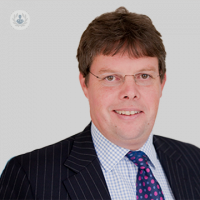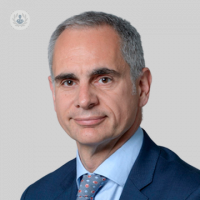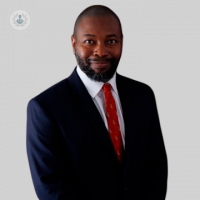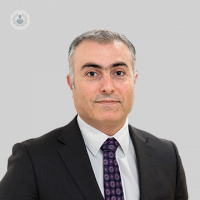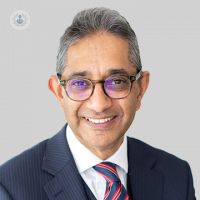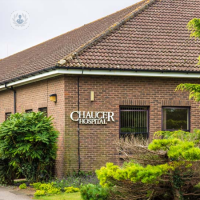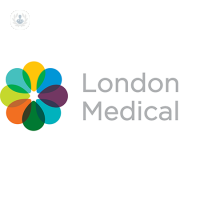
What is head and neck cancer?
Head and neck cancer can refer to a number of different types of tumours in various parts of the head and neck, including the mouth, lips, larynx (voice box), pharynx (throat), salivary glands, nose, and sinuses.
Cancer is a disease in which a group of cells in the body malfunction and multiply uncontrollably, forming a mass. This mass of abnormal cell growth is known as a malignant tumour. Cancerous cells continue to grow and divide, avoid programmed cell death, and replace normal, healthy cells, with a tendency to spread and invade other tissues.
Head and neck cancer is relatively uncommon, with around 10,000 cases diagnosed in the UK each year.
Types of head and neck cancer include:
- Mouth cancer
- Laryngeal cancer
- Throat cancer
- Salivary gland cancer
- Nose and sinus cancer
What are the symptoms of head and neck cancer?
They symptoms depend on the type and location of the cancer. Possible symptoms include:
- Lumps or swelling in the neck, mouth or jaw
- Persistent sore throat
- Dysphagia or pain when swallowing
- Hoarseness
- Mouth ulcers that don’t heal
- Changes in your voice
- Earache
- Nosebleeds
Prognosis of head and neck cancer
Like all cancers, head and neck cancers can be fatal if left untreated or treated too late. However, many treatments exist to combat cancer, and curing it is possible in many cases.
What are the causes of head and neck cancer?
Some risk factors vary depending on the type and location of cancer, but smoking and excessive consumption of alcohol are risk factors for most types of head and neck cancer. Exposure to harmful substances, infection with HIV, family history, and gender can also be factors.
Can head and neck cancer be prevented?
The biggest risk factor for head and neck cancer is tobacco consumption. Consuming a lot of alcohol regularly also increases the risk. By cutting down on these, or by stopping smoking and drinking altogether, you can lower your risk of developing cancer. However, there is no 100% guarantee.
Treatments for head and neck cancer
The type of treatment recommended depends greatly on the type and location of the cancer, but some of the usual options for cancer treatment include:
- Chemotherapy
- Radiotherapy
- Surgery – the cancerous cells are cut out surgically, along with a tiny bit of the surrounding, apparently healthy cells, just to be sure the cancer is all gone.
These treatments are often used in tandem to give the patient the greatest chance of eradicating the cancer with the least possible damage to their body.
Which type of specialist treats head and neck cancer?
A number of specialists may be involved in diagnosing and treating head and neck cancer. Oncologists specialist in treating cancer, while ENT surgeons and oral and maxillofacial surgeons may be brought in to operate on the patient, depending on the location of the tumour.
06-14-2017 10-24-2024Head and neck cancer
Professor Chris Nutting - Clinical oncology
Created on: 06-14-2017
Updated on: 10-24-2024
Edited by: Kate Forristal

What is head and neck cancer?
Head and neck cancer can refer to a number of different types of tumours in various parts of the head and neck, including the mouth, lips, larynx (voice box), pharynx (throat), salivary glands, nose, and sinuses.
Cancer is a disease in which a group of cells in the body malfunction and multiply uncontrollably, forming a mass. This mass of abnormal cell growth is known as a malignant tumour. Cancerous cells continue to grow and divide, avoid programmed cell death, and replace normal, healthy cells, with a tendency to spread and invade other tissues.
Head and neck cancer is relatively uncommon, with around 10,000 cases diagnosed in the UK each year.
Types of head and neck cancer include:
- Mouth cancer
- Laryngeal cancer
- Throat cancer
- Salivary gland cancer
- Nose and sinus cancer
What are the symptoms of head and neck cancer?
They symptoms depend on the type and location of the cancer. Possible symptoms include:
- Lumps or swelling in the neck, mouth or jaw
- Persistent sore throat
- Dysphagia or pain when swallowing
- Hoarseness
- Mouth ulcers that don’t heal
- Changes in your voice
- Earache
- Nosebleeds
Prognosis of head and neck cancer
Like all cancers, head and neck cancers can be fatal if left untreated or treated too late. However, many treatments exist to combat cancer, and curing it is possible in many cases.
What are the causes of head and neck cancer?
Some risk factors vary depending on the type and location of cancer, but smoking and excessive consumption of alcohol are risk factors for most types of head and neck cancer. Exposure to harmful substances, infection with HIV, family history, and gender can also be factors.
Can head and neck cancer be prevented?
The biggest risk factor for head and neck cancer is tobacco consumption. Consuming a lot of alcohol regularly also increases the risk. By cutting down on these, or by stopping smoking and drinking altogether, you can lower your risk of developing cancer. However, there is no 100% guarantee.
Treatments for head and neck cancer
The type of treatment recommended depends greatly on the type and location of the cancer, but some of the usual options for cancer treatment include:
- Chemotherapy
- Radiotherapy
- Surgery – the cancerous cells are cut out surgically, along with a tiny bit of the surrounding, apparently healthy cells, just to be sure the cancer is all gone.
These treatments are often used in tandem to give the patient the greatest chance of eradicating the cancer with the least possible damage to their body.
Which type of specialist treats head and neck cancer?
A number of specialists may be involved in diagnosing and treating head and neck cancer. Oncologists specialist in treating cancer, while ENT surgeons and oral and maxillofacial surgeons may be brought in to operate on the patient, depending on the location of the tumour.


What to expect: A detailed guide to radioactive iodine therapy for patients
By Professor Chris Nutting
2024-11-21
Professor Chris Nutting gives an expert guide for patients on what to expect from radioactive iodine therapy, often administered following surgery to remove a thryoid cancer. See more


Neck lumps: What to know
By Mr Peyman Alam
2024-11-21
Leading consultant oral and maxillofacial surgeon Mr Peyman Alam gives an all-you-need-to-know guide to neck lumps and when to see a specialist in this informative article. See more


Skin cancer of the head and neck
By Professor Kavin Andi
2024-11-21
Some people may not be aware of the different forms of head and neck cancer that can occur. Professor Kavin Andi, award-winning consultant oral and maxillofacial, and head and neck surgeon, speaks to Top Doctors about these, giving comprehensive advice about what signs to look for and treatment. See more
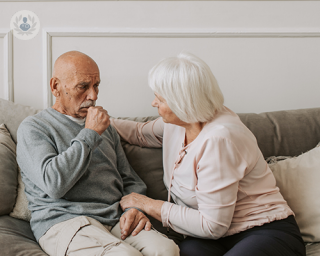

Head and neck cancer explained
By Mr Vikram Dhar
2024-11-21
Head and neck cancer is a relatively uncommon type of cancer, with around 12,000 cases diagnosed in the UK each year. Here, Mr Vikram Dhar, renowned consultant ENT and head and neck surgeon, shares his expert insight on the different types, the risk factors and the diagnosis of head and neck cancer, as well as the support available for patients. See more
Experts in Head and neck cancer
-
Mr Ricard Simo
Otolaryngology / ENTExpert in:
- Dysphagia
- Head and neck cancer
- Thyroid gland surgery
- Parathyroid gland
- Pharyngeal pouch
- Salivary gland surgery
-
Professor Kavin Andi
Oral & maxillofacial surgeryExpert in:
- Mouth cancer
- Skin cancer
- Oral surgery
- Head and neck cancer
- Salivary gland surgery
- Facial reconstruction
-
Professor Chris Nutting
Clinical oncologyExpert in:
- Intensity-modulated radiation therapy (IMRT)
- Thyroid cancer
- Head and neck cancer
- CyberKnife
- Radiotherapy
-
Mr Zaid Awad
Otolaryngology / ENTExpert in:
- Robotic surgery
- Neck lump
- Endoscopic sinus surgery
- Head and neck cancer
- Dysphagia
- Snoring
-
Mr Bhavin G Visavadia
Oral & maxillofacial surgeryExpert in:
- Facial plastic surgery
- Dental implants
- Facial reconstruction
- Head and neck cancer
- Oral surgery
- Salivary gland surgery
- See all

The Chaucer Hospital - part of Circle Health Group
The Chaucer Hospital - part of Circle Health Group
Nackington Rd, Canterbury CT4 7AR,
No existe teléfono en el centro.
By using the telephone number provided by TOP DOCTORS, you automatically agree to let us use your phone number for statistical and commercial purposes. For further information, read our Privacy Policy
Top Doctors

London Medical
London Medical
49 Marylebone High Street, W1U 5HJ
No existe teléfono en el centro.
By using the telephone number provided by TOP DOCTORS, you automatically agree to let us use your phone number for statistical and commercial purposes. For further information, read our Privacy Policy
Top Doctors

Ross Hall Hospital - part of Circle Health Group
Ross Hall Hospital - part of Circle Health Group
221 Crookston Road, Glasgow G52 3NQ
No existe teléfono en el centro.
By using the telephone number provided by TOP DOCTORS, you automatically agree to let us use your phone number for statistical and commercial purposes. For further information, read our Privacy Policy
Top Doctors
-
The Chaucer Hospital - part of Circle Health Group
Nackington Rd, Canterbury CT4 7AR,, CanterburyExpert in:
- Hip
- Cataracts
- Orthopaedic surgery
- Ophthalmology
- Knee
-
London Medical
49 Marylebone High Street, W1U 5HJ, Central LondonExpert in:
- Cardiology
- Adult Diabetes
- Child Diabetes
- Endocrinology
- General practice
- Ophthalmology
-
Ross Hall Hospital - part of Circle Health Group
221 Crookston Road, Glasgow G52 3NQ, GlasgowExpert in:
- Cancer
- Cardiology
- Colorectal surgery
- Dermatology
- Back pain
- Endocrinology
- See all
- Most viewed diseases, medical tests, and treatments
- CAR-T cells
- Hormone therapy
- Migraine
- Hodgkin's lymphoma
- Genetic testing
- Nipple discharge
- Minimal access surgery (keyhole surgery)
- Neck lump
- Acellular dermal matrix (ADM)
- Prepectoral breast reconstruction
